外研版英语必修四 MODULE(2-4)Grammar & writing(共26张PPT)
高一英语外研版必修4module4教案
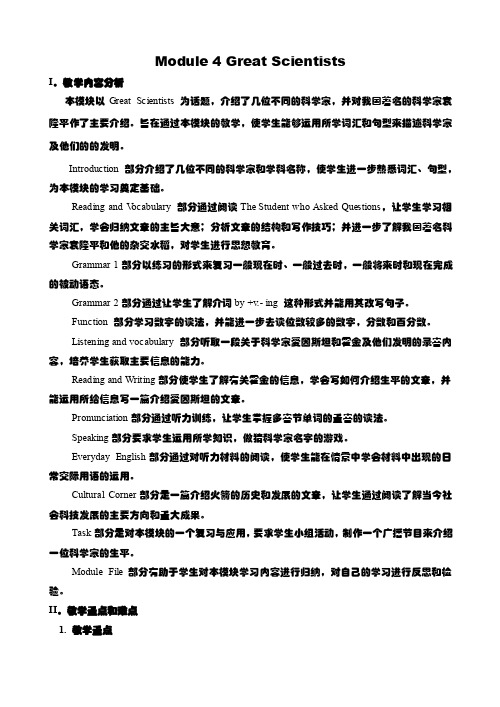
Module 4 Great ScientistsI.教学内容分析本模块以Great Scientists 为话题,介绍了几位不同的科学家,并对我国著名的科学家袁隆平作了主要介绍。
旨在通过本模块的教学,使学生能够运用所学词汇和句型来描述科学家及他们的的发明。
Introduction 部分介绍了几位不同的科学家和学科名称,使学生进一步熟悉词汇、句型,为本模块的学习奠定基础。
Reading and V ocabulary 部分通过阅读The Student who Asked Questions,让学生学习相关词汇,学会归纳文章的主旨大意;分析文章的结构和写作技巧;并进一步了解我国著名科学家袁隆平和他的杂交水稻,对学生进行思想教育。
Grammar 1部分以练习的形式来复习一般现在时、一般过去时,一般将来时和现在完成的被动语态。
Grammar 2部分通过让学生了解介词by +v.- ing 这种形式并能用其改写句子。
Function 部分学习数字的读法,并能进一步去读位数较多的数字,分数和百分数。
Listening and vocabulary 部分听取一段关于科学家爱因斯坦和霍金及他们发明的录音内容,培养学生获取主要信息的能力。
Reading and Writing部分使学生了解有关霍金的信息,学会写如何介绍生平的文章,并能运用所给信息写一篇介绍爱因斯坦的文章。
Pronunciation部分通过听力训练,让学生掌握多音节单词的重音的读法。
Speaking部分要求学生运用所学知识,做猜科学家名字的游戏。
Everyday English部分通过对听力材料的阅读,使学生能在情景中学会材料中出现的日常交际用语的运用。
Cultural Corner部分是一篇介绍火箭的历史和发展的文章,让学生通过阅读了解当今社会科技发展的主要方向和重大成果。
Task部分是对本模块的一个复习与应用,要求学生小组活动,制作一个广播节目来介绍一位科学家的生平。
2019外研版高中英语选择性必修四Unit4 单元语法详解课件
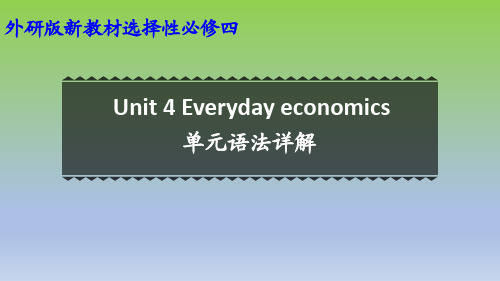
● 温馨提示:主句是疑问句时,首先要确定定语从先行词, 方法是将疑问句恢复成肯定句,然后进行辨别确认, 请观察 以下句子
a. Is this the factory __(_t_h_a_t_/w__h_ic_h_)__ we visited last week?
※肯定句:This is the factory(_th_a_t_/_w__h_ic_h)we visited last week.
1. I will never forget the day __w_h_e__n_ I first went to school. 2. I will never forget the day _w__h_i_c_h_/_t_h_a_t_ we spent in Beijing. 3. The house w__h_i_c_h_/_t_h_a_t_ we visited is being repaired now.
※先行词既有人又有物时,请观察以下句子
They talked about the persons and things (that) they knew in the school.
● 关系代词 that前不加介词; 非限定性定语从句不用 that 引导,请观察以下句子
a. This is the house in which Luxun once lived (in that)
d. He who has not been to the Great Wall is not a true man.
●不管先行词是人还是物,用 that 的两种情况 ※ 由 which 和 who 开头的特殊问句中避免重复, 请观察以 下句子
a. Which is the subject ( that ) you are going to learn next term? b. Who is the man that came to see you just now?
外研 高中英语必修4Module 2Grammar(共24张PPT)
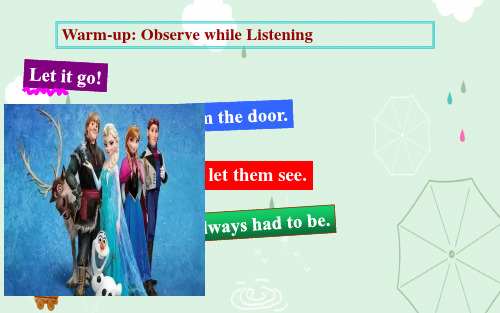
昨日的明天是今天。明天的昨日是今天。为什么要计较于过去呢(先别急着纠正我的错误,你确实可以在评判过去中学到许多)。但是我发现有的人过分地瞻前顾后了。为 何不想想“现在”呢?为何不及时行乐呢?如果你的回答是“不”,那么是时候该重新考虑一下了。成功的最大障碍是惧怕失败。这些句子都教育我们:不要惧怕失败。如 果你失败了他不会坐下来说:“靠,我真失败,我放弃。”并且不是一个婴儿会如此做,他们都会反反复复,一次一次地尝试。如果一条路走不通,那就走走其他途径,不 断尝试。惧怕失败仅仅是社会导致的一种品质,没有人生来害怕失败,记住这一点。宁愿做事而犯错,也不要为了不犯错而什么都不做。不一定要等到时机完全成熟才动手。 开头也许艰难,但是随着时间的流逝,你会渐渐熟悉你的事业。世上往往没有完美的时机,所以当你觉得做某事还不是时候,先做起来再说吧。喜欢追梦的人,切记不要被 梦想主宰;善于谋划的人,切记空想达不到目标;拥有实干精神的人,切记选对方向比努力做事重要。太阳不会因为你的失意,明天不再升起;月亮不会因为你的抱怨,今 晚不再降落。蒙住自己的眼睛,不等于世界就漆黑一团;蒙住别人的眼睛,不等于光明就属于自己!鱼搅不浑大海,雾压不倒高山,雷声叫不倒山岗,扇子驱不散大雾。鹿 的脖子再长,总高不过它的脑袋。人的脚指头再长,也长不过他的脚板。人的行动再快也快不过思想!以前认为水不可能倒流,那是还没有找到发明抽水机的方法;现在认 为太阳不可能从西边出来,这是还没住到太阳从西边出来的星球上。这个世界只有想不到的,没有做不到的!不是井里没有水,而是挖的不够深;不是成功来的慢,而是放 弃速度快。得到一件东西需要智慧,放弃一样东西则需要勇气!终而复始,日月是也。死而复生,四时是也。奇正相生,循环无端,涨跌相生,循环无端,涨跌相生,循环 无穷。机遇孕育着挑战,挑战中孕育着机遇,这是千古验证了的定律!种子放在水泥地板上会被晒死,种子放在水里会被淹死,种子放到肥沃的土壤里就生根发芽结果。选
外研版高一英语必修四unit4语法课教案设计

Lesson plan for Great ScientistsTeachi ng Procedurese.The new hybrid rice has been developed by the Yuan Longping High-tech Agriculture Company of China.T:Now answer the following questions.1 .Which sentence is in the present simple(passive voice)?2 .Which sentences are in the past simple(passive voice)?3 .Which sentence refers to the future?4 .Which sentence is in the present perfect?3. Present the passive voice with four tenses on PPT the present simple, the past simple, the futuresimple, and the present perfect; then explain the usage of the sentences from the PPT one by one.4. Conclude the forms of the passive voice and show it on PPT. Let Ss learn to observe the sentences structures and distinguish the different tenses.The teacher guides the students to make a simple summary of the voice they have learned and form a clear concept of it.Stage 3 Practice (10mins)1. Ask Ss to do the exercise 1 and exercise 2 of different tenses about the passive voice. 厂 一Exercise 1 J 1.1 vxltfl monry ______ . Ihe lliedltv illA. was fnundB. find 吊 1 round Ik fonrid«rv cnnriiJ<nt ihiHenvironment _______ hy our furthervl'Jbrh tu induct pullulion.A. had been improved ' hr iniproi «dC?. k impiwcd 1). WHS improvrdXU nalliing _______ , Uiv(K?c3ns «111 turn inlo I LS J I deserts,A. doe\ B* h 刘d been done will 号 JuneExercise 2Fill in the blanks.Part oneLihui: Let's learn other scientists.Lihua: Cailun is a great inventor I'd like to talk.Lihui: Great,we all know that Papermaking _____________________ (invent) by him.Lihua:Yes,with the development of society, different types of paper _____________________ (develope) sofar.Lihui:Maybe in the future, new paper ________________ (create) and ________ (use) in other area.Part 2Tom:Do you know some famous scientists?Tina:Yes,Stephen Hawking,he _________________ (know) at home and abroad widely.Tom:for example?Tina:He ___________ (graduate) from Oxford University.In the 1960s,He (diagnose)with motor neurone disease.but he never gave up, his book A Briefbe +doneDesigning purposeHistory of Time(publish)in 1988.He is so outstanding and we(influence) by him.Tom:Right.we all believe his work(use) in other new field that(explore) by others scientists recently.Stage4 Production Discussion and making sentences in groups.(11 mins ) 1.Teacher show some pictures in the PPT, then ask Ss to discuss and describe the picture byusing the correct form of passive voice in groups. And some prompts are given besides the picture.T: I think you have learned passive voice by hearts. Now, we will make some sentences in passive voice inpassive voice.You know,we should learn not only their forms but also how to use them correctly. Ask Ss todiscuss the exercise in groups and finish it.Practice 1: Make sentences according to the pictures and given words.2.Write a short dialogue within sive sentences to describe the scientists with the right types of PV.Scientists are as follows:MadameCurie,Edison ect.3.Give some comments on the Ss' performance and then give a brief conclusion.Blackboard/PPT Design(板书 /媒体设计)Module 4 The Passive VoiceBe+done1.the present simple: am/is/are+done2.the past simple: was/were+done3.the future simple: will be+done4.the present perfect: have/has+been+done。
外研版必修4 Module4 Great Scientists Grammar
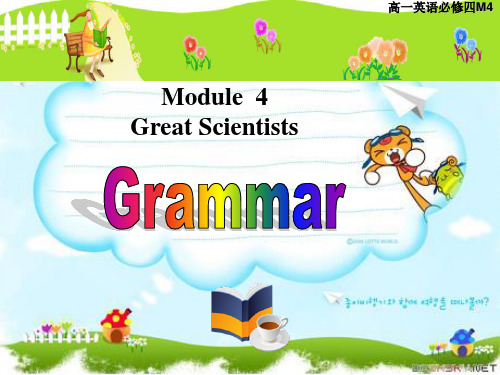
Lead-in
1. Which sentence is in the present simple (Passive voice)? a 2. Which sentences are in the past simple (Passive voice)? b and c 3. Which sentence refers to the future? d 4. Which sentence is in the present perfect? e 5. Which sentences are easy to transform into the active voice? Why? c and e, because you can easily find the subject of the active voice after “by”.
3. When ______________________________________? were the results of the experiment published
3. The research was supported by the government.
4. In pakistan rice will be grown in many parts of the country. 5. The new hybrid rice has been developed by Yuan Longping High-tech Agricultural Company of China.
Explaining
Finish the exercises of Activity 3 on page 34. was educated (educate) in many schools. 1. As a boy he _____________ 2. He ___________(give) the nickname, “the student who was given asks questions”. 3. The results of his experiments ______________(publish) were published in China in 1996. 4. Finally, in 1970 a naturally sterile male rice plant ________________(discover). was discovered 5. 50 thousand square kilometres of rice fields were __________ converted (convert) to growing vegetables. 6. Following this, Yuan Longping’s rice ______________ was exported (export) to other countries.ThinkngDiscussing
英语:Module 2《Traffic Jam》教案-Grammar(外研版必修4)
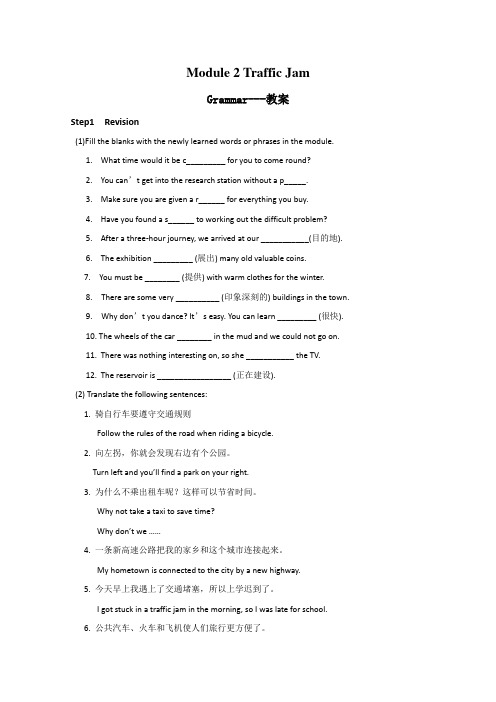
Module 2 Traffic JamGrammar---教案Step1 Revision(1)Fill the blanks with the newly learned words or phrases in the module.1.What time would it be c_________ for you to come round?2.You can’t get into the research station without a p_____.3.Make sure you are given a r______ for everything you buy.4.Have you found a s______ to working out the difficult problem?5.After a three-hour journey, we arrived at our ___________(目的地).6.The exhibition _________ (展出) many old valuable coins.7. You must be ________ (提供) with warm clothes for the winter.8. There are some very __________ (印象深刻的) buildings in the town.9. Why don’t you dance? It’s easy. You can learn _________ (很快).10. The wheels of the car ________ in the mud and we could not go on.11.There was nothing interesting on, so she ___________ the TV.12.The reservoir is _________________ (正在建设).(2)Translate the following sentences:1. 骑自行车要遵守交通规则Follow the rules of the road when riding a bicycle.2. 向左拐,你就会发现右边有个公园。
高中英语必修四知识点外研版(可编辑修改word版)
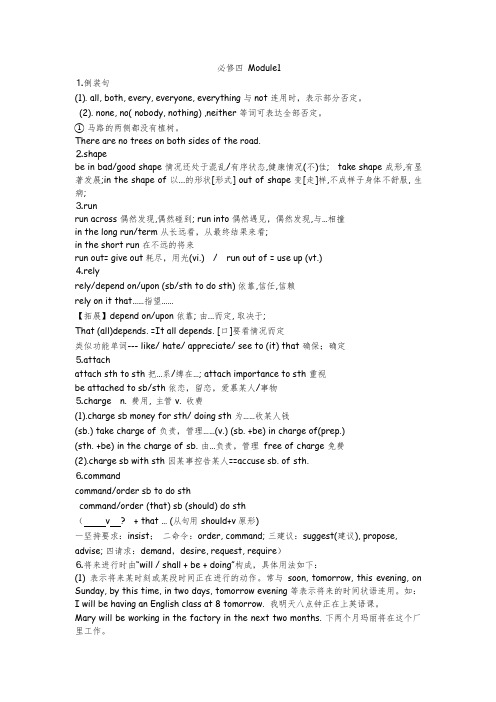
必修四Module1⒈倒装句(1). all, both, every, everyone, everything 与not 连用时,表示部分否定。
(2). none, no( nobody, nothing) ,neither 等词可表达全部否定。
① 马路的两侧都没有植树。
There are no trees on both sides of the road.⒉shapebe in bad/good shape 情况还处于混乱/有序状态,健康情况(不)佳; take shape 成形,有显著发展;in the shape of 以...的形状[形式] out of shape 变[走]样,不成样子身体不舒服, 生病;⒊runrun across 偶然发现,偶然碰到; run into 偶然遇见,偶然发现,与…相撞in the long run/term 从长远看,从最终结果来看;in the short run 在不远的将来run out= give out 耗尽,用光(vi.) / run out of = use up (vt.)⒋relyrely/depend on/upon (sb/sth to do sth) 依靠,信任,信赖rely on it that……指望……【拓展】depend on/upon 依靠; 由...而定, 取决于;That (all)depends. =It all depends. [口]要看情况而定类似功能单词--- like/ hate/ appreciate/ see to (it) that 确保;确定⒌attachattach sth to sth 把…系/缚在…; attach importance to sth 重视be attached to sb/sth 依恋,留恋,爱慕某人/事物⒌charge n. 费用, 主管v. 收费(1).charge sb money for sth/ doing sth 为……收某人钱(sb.) take charge of 负责,管理……(v.) (sb. +be) in charge of(prep.)(sth. +be) in the charge of sb. 由…负责,管理free of charge 免费(2).charge sb with sth 因某事控告某人==accuse sb. of sth.⒍commandcommand/order sb to do sthcommand/order (that) sb (should) do sth(v ? + that … (从句用should+v 原形)一坚持要求:insist;二命令:order, command; 三建议:suggest(建议), propose, advise; 四请求:demand,desire, request, require)⒍将来进行时由“will / shall + be + doing”构成,具体用法如下:(1)表示将来某时刻或某段时间正在进行的动作。
最新外研版高中英语必修四课文文本
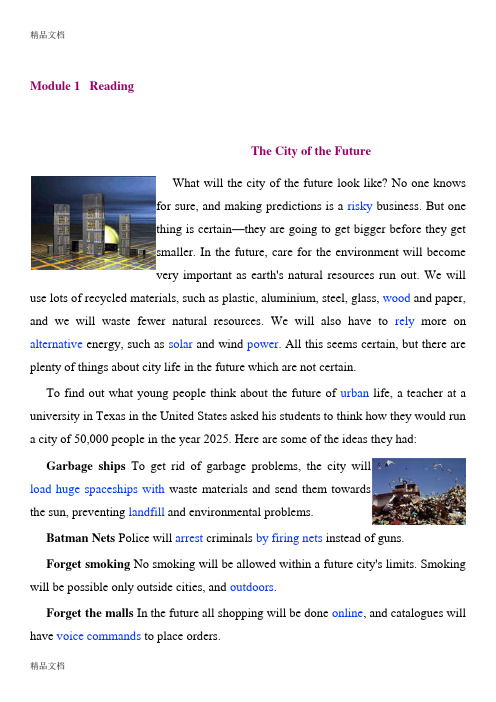
Module 1 ReadingThe City of the FutureWhat will the city of the future look like? No one knowsfor sure, and making predictions is a risky business. But onething is certain—they are going to get bigger before they getsmaller. In the future, care for the environment will becomevery important as earth's natural resources run out. We will use lots of recycled materials, such as plastic, aluminium, steel, glass, wood and paper, and we will waste fewer natural resources. We will also have to rely more on alternative energy, such as solar and wind power. All this seems certain, but there are plenty of things about city life in the future which are not certain.To find out what young people think about the future of urban life, a teacher at a university in Texas in the United States asked his students to think how they would run a city of 50,000 people in the year 2025. Here are some of the ideas they had:Garbage ships To get rid of garbage problems, the city willload huge spaceships with waste materials and send them towardsthe sun, preventing landfill and environmental problems.Batman Nets Police will arrest criminals by firing nets instead of guns.Forget smoking No smoking will be allowed within a future city's limits. Smoking will be possible only outside cities, and outdoors.Forget the malls In the future all shopping will be done online, and catalogues will have voice commands to place orders.Telephones for life Everyone will be given a telephone number at birth that will never change no matter where they live.Recreation All forms of recreation, such as cinemas, bowling, softball, concerts and others, will be provided free of charge by the city.Cars All cars will be powered by electricity, solar energy or wind, and it will be possible to change the colour of cars at the flick of a switch.Telesurgery Distance surgery will become common as doctors carry out operations from thousands of miles away, with each city having its own telesurgery outpatient clinic.Holidays at home Senior citizens and people with disabilities will be able to go anywhere in the world using high-tech cameras attached to their head.Space travel Travelling in space by ordinary citizens will be common. Each city will have its own spaceport.Cultural CornerFamous Last WordsNot all predictions come true. Many of them are wrong, and some are very wrong. Here are just a few of the bad predictions people made in the twentieth century about the twenty-first century:AIRPLANES"No flying machine will ever fly from New York to Paris."Orville Wright, 1908. COMPUTERS"I think there is a world market for maybe five computers."Thomas Waston, chairman of IBM, 1943. CLOTHES"Thirty years from now people will be wearing clothes made of paper which they will be able to throw away after wearing them two or three times."Changing Times Magazine, 1957. MEN ON THE MOON"With the first moon colonies predicted for the 1970's, work is now in progress on the types of building required for men to stay in when they're on the moon."Arnold B. Barach in The Changes to Come, 1962. THE BEATLES"We don't like their sound, and guitar music is on the way out."Decca Recording Co. rejecting the Beatles, 1962. ROBOTS IN THE HOUSE"By the year 2000, housewives will probably have a robot shaped like a box with one large eye on the top, several arms and hands, and long narrow pads on the side for moving about."New York Times, 1966.KEYS"By the mid-1980's no one will ever need to hide a keyunder the doormat again, because there won't be anykeys."Computer scientist Christopher Evans,The Micro Millennium, 1979.Module 2 ReadingGetting Around in BeijingTaxisTaxis are on the streets 24 hours a day. Simply raise yourhand, and a taxi appears in no time. They are usually red, andthey display the price per kilometre on the window. Youshould check the cab has a business permit, and make sure you ask for a receipt.Buses and trolleybusesPublic transport provides a cheap way to get around in Beijing. There are 20,000 buses and trolleybuses in Beijing, but they can get very crowded. It's a good idea to avoid public transport during the rush hour (6:30 a.m.–8:00 a.m. and 5:00 p.m.–6:30 p.m.). Fares are cheap, starting at 1 yuan. Air-conditioned buses cost more.Buses numbered 1 to 100 are limited to travel within the city centre. Higher numbers have destinations in the suburbs. Tourists shouldn't miss the 103 bus which offers one of the most impressive routes, past the Forbidden City and the White Pagoda in Beihai Park. If you get on a double-decker bus, make sure you sit upstairs. You'll have a good view of the rapidly changing city.Most buses run from about 5:00 a.m. to midnight. However, there is also a night bus service, provided by buses with a number in the 200s.MinibusesMinibuses with seats for 12 passengers offer an alternative to expensive taxis and crowded public transport in some areas. They run regular services and follow the same routes as large public buses. And in a minibus you always get a seat even in rush hours. UndergroundThere are four underground lines in Beijing, and several lines are under construction. Trains are fast and convenient, but rush hours can be terrible. A one-way trip costs 3 yuan. Station names are marked in pinyin. The underground is open from 5:00 a.m. to 11:00 p.m.PedicabsTourists like these human-pedalled "tricycle taxis", but they can be expensive. You should talk to the driver, and make sure you know the price before you begin the journey, for example, if it is per person, single or return. Tricycles are worth using if you want to explore the narrow alleys (hutong) of old Beijing.Cultural CornerThe London Congestion ChargeBeijing isn't the only city with traffic problems. You can get stuck in a traffic jam anywhere in the world. The worst problems occur in cities which are growing fast, such as Sao Paolo in Brazil and Lagos in Nigeria. But even cities in developed countries such as the US suffer. Los Angeles, which was built with the motor car in mind, and is famous for its six-lane highways, is now theUSA's most congested city.In Europe most capital cities were planned and builtbefore cars, and city centre traffic jams have been part ofdaily life for a long time. The situation in central London,where drivers spent fifty percent of their time in queues, became so bad that the local government decided to do something about it. In February 2003 the Mayor of London, Ken Livingstone, introduced a "congestion charge"—a tax for cars entering the centre of the city.The idea is simple: every car coming into the centre has to pay £5 a day. Drivers can pay the charge at any of 10,000 pay points in the capital before 10 p.m. As the cars come into the centre, video cameras record their registration numbers, and these are checked with a list of drivers who have paid the charge for that day. People who do not pay the charge will face a fine of £80.Most Londoners are not happy with the idea. They agree that London has a traffic problem, but the congestion charge is expensive, and limits their freedom ...But does the congestion charge work? A survey carried out at the end of 2003 suggests it does. After only six months, traffic coming into central London was reduced by about 30 percent, and journey times by 15 percent. More people used public transport to get to work, and bicycles were suddenly very popular. What's more, central London shops did not lose business even though there were fewer cars.But there are a few people who think the charge should be much higher, for example rich businessmen who work in the city centre and can easily afford it. This would keep even more cars out of central London, and the roads would be nearly empty. However, there are no plans to increase the charge.Module 3 ReadingGreetings Around the WorldIf you say the word "communication", most people thinkof words and sentences. Although these are very important,we communicate with more than just spoken and written words. Indeed, body positions are part of what we call "body language". We see examples of unconscious body language very often, yet there is also "learned" body language, which varies from culture to culture.We use "learned" body language when we are introduced to strangers. Like other animals, we are on guard until we know it is safe to relax. So every culture has developed a formal way to greet strangers, to show them we are not aggressive. Traditionally, Europeans and Americans shake hands. They do this with the right hand—the strongest hand for most people. If our right hand is busy greeting someone, it cannot be holding a weapon. So the gesture is saying, "I trust you. Look, I'm not carrying a threatening weapon." If you shake hands with someone, you show you trust them. We shake hands when we make a deal. It means, "We agree and we trust each other."Greetings in Asian countries do not involve touching the other person, but they always involve the hands. Traditionally in China, when we greet someone, we put the right hand over the left and bow slightly. Muslims give a "salaam", where they touch their heart, mouth and forehead. Hindus join their hands and bow their heads in respect. In all of these examples, the hands are busy with the greeting and cannot hold a weapon.Even today, when some people have very informal styles of greeting, they still use their hands as a gesture of trust. American youths often greet each other with the expression, "Give me five!" One person then holds up his hand, palm outwards and five fingers spread. The other person raises his hand and slaps the other's open hand above the head in a "high five". Nowadays, it is quite a common greeting.Body language is fascinating for anyone to study. People give away much more by their gestures than by their words. Look at your friends and family and see if you are a mind reader!Cultural CornerClappingWhy do we clap? To show we like something, of course. But we don't clap at the end of a television programme or a book, however good they are. We clap at the end of a live performance, such as a play, or a concert, to say thank you to the performers. First they give, and then we give. Without us—the audience—the performance would not be complete.The custom of clapping has early beginnings. In classical Athens, applause meant judgement and taking part. Plays were often in competition with each other, and prolonged clapping helped a play to win. The theatre was large—it could hold 14,000 people, half the adult male population of the city, which meant that the audience could make a lot of noise.Applause was a sign of being part of the community, andof equality between actors and audience. The important thingwas to make the noise together, to add one's own smallhandclap to others. Clapping is social, like laughter: you don'tvery often clap or laugh out loud alone. It is like laughter inanother way, too: it is infectious, and spreads very quickly. Clapping at concerts and theatres is a universal habit. But some occasions on which people clap change from one country to another. For example, in Britain people clap at a wedding, but in Italy they sometimes clap at a funeral.Module 4 ReadingThe Student Who Asked QuestionsIn a hungry world rice is a staple food and China is theworld's largest producer. Rice is also grown in many otherAsian countries, and in some European countries like Italy. Inthe rice-growing world, the Chinese scientist, Yuan Longping,is a leading figure.Yuan Longping was born and brought up in China. As a boy he was educated in many schools and was given the nickname, "the student who asks questions".From an early age he was interested in plants. He studied agriculture in college and as a young teacher he began experiments in crop breeding. He thought that the key to feeding people was to have more rice and to produce it more quickly. He thought there was only one way to do this—by crossing different species of rice plant, and then he could produce a new plant which could give a higher yield than either of the original plants.First Yuan Longping experimented with different types of rice. The results of his experiments were published in China in 1966. Then he began his search for a special type of rice plant. It had to be male. It had to be sterile. Finally, in 1970 a naturally sterile male rice plant was discovered. This was the breakthrough. Researchers were brought in from all over China to develop the new system. The research was supported by the government.As a result of Yuan Longping's discoveries Chinese rice production rose by 47.5 percent in the 1990's. There were other advantages too. 50 thousand square kilometres of rice fields were converted to growing vegetables and other cash crops. Followingthis, Yuan Longping's rice was exported to other countries, such as Pakistan and the Philippines.In Pakistan rice is the second most important crop after wheat and will be grown in many parts of the country. The new hybrid rice has been developed by the Yuan Longping Hightech Agricultural Company of China. Its yield is much greater than the yield of other types of rice grown in Pakistan.Cultural CornerRocketsToday rockets are very advanced machines which we can use to send astronauts into space. They are also used in firework displays to celebrate great events, such as the end of the Olympic Games or the beginning of the new millennium in the year 2000.Rockets were probably invented by accident about 2,000 years ago. The Chinese had a form of gunpowder which was put in bamboo tubes and thrown into fires to make explosions during festivals. Perhaps some of the tubes jumped out of the fire instead of exploding in it. The Chinese discovered that the gas escaping from the tube could lift it into the air. The idea of the rocket was born.The first military use of rockets was in 1232. The Song Dynasty was at war with the Mongols. During the battle of Kaifeng, the Song army shot "arrows of flying fire". The tubes were attached to a long stick which helped keep the rocket moving in a straight direction. Soon the Mongols learned how to make rockets themselves and it is possible that they introduced them to Europe. Between the 13th and 15th centuries there were many rocket experiments in England, France and Italy. They were used formilitary purposes. One Italian scientist even invented a rocket which could travel over the surface of water and hit an enemy ship.But not everybody wanted to use rockets in battles. Wan Hu, a Chinese government official, invented a flying chair. He attached two big kites to the chair, and 47 rockets to the kites. The rockets were lit, there was a huge explosion and clouds of thick smoke. When the smoke cleared Wan Hu and his chair had disappeared. No one knows what happened. Did Wan Hu die in the explosion? Or was he carried miles into space, becoming the world's first astronaut?Module 5 ReadingA Trip Along the Three GorgesIn August 1996, Peter Hessler, a young American teacher of English, arrived in the town of Fuling on the Yangtze River. He and a colleague were to spend two years there teaching English at a teacher training college. They were the only foreigners in the town. The first semester finished at the end of January and they had four weeks off for the Spring Festival. They could go anywhere they wished. They decided to take aboat downstream.We decided to buy tickets for the Jiangyou boat. Our colleagues said, "You shouldn't go on those ships. They are very crowded. They are mainly for goods and people trading along the river. They don't stop at the temples and there won't be any other foreigners." That sounded fine to me. We just had to show our passports and they let us get on the boat.We left the docks on a beautiful afternoon. The sun was shining brightly as we sailed downstream through a hilly region. Men rode bamboo rafts along the river's edge and coal boats went past. As the sun set we docked at Fengdu. We could see the sun setting behind the white pagoda. It was beautiful.We slept through the first gorge, which is called the Qutang Gorge. The gorge narrows to 350 feet as the river rushes through the two-mile-high mountains. "Oh, well," my friend said, "at least we have two more left."At Wushan we made a detour up the Daning River to see some of the smaller gorges. The next day we went through the big gorges on the Yangtze River. It was a lovely morning as we went through the Wu Gorge. We passed the Xiang River, home of Qu Yuan, the 3rd century BC poet. There was so much history along the Yangtze River. Every rock looked like a person or animal, every stream that joined the great river carried its legends, every hill was heavy with the past.As we came out of the third gorge, the Xiling Gorge, we sailed into the construction site of the dam. All the passengers came on deck. We took pictures and pointed at the site, but we weren't allowed to get off the boat. The Chinese flag was blowing in the wind. On a distant mountain was a sign in 20-foot characters. "Build the Three Gorges Dam, Exploit the Yangtze River," it said.Cultural CornerPostcards to MyselfIn 50 years of travelling Colin McCorquodale has visitedevery country in the world, except three. And everywhere hegoes, he sends himself a postcard. He always chooses apostcard with a beautiful view, and sticks on an interestingstamp. Usually he writes just a short message to himself. Hislatest one, from the Malvinas islands, reads Good fishing.On a wall in his home in London there is a large map ofthe world. There are hundreds of little red pins stuck in it. "It's good to get a pin in the map," says Mr McCorquodale, "but I follow the rules. I'm allowed to stick one in only if I've been in a place for more than 24 hours." Naturally, Mr McCorquodale has his favourite places. New Zealand he describes as "wonderful". In Europe, Italy is a favourite place. "There's a saying in the travel trade that all tourists are ripped off. Well, at least the Italians rip you off with a smile." Of China he says,"This is one country in the world which is completely different. There's no European influence. It's been around for 6,000 years, yet it's a country of the future."Wherever he goes, Mr McCorquodale takes with him aphoto of his wife, a candle, a torch, a shirt with a secretpocket, and a pen for writing his postcards.So why does he do it? For the postcards or the travel? MrMcCorquodale laughs. "I do it for the journey," he says. "Iget a kick out of travelling. And all the planning."Module 6 ReadingThe Monster of Lake TianchiThe "Monster of Lake Tianchi" in the Changbai Mountains in Jilin province, northeast China, is back in the news after several recent sightings. The director of a local tourist office, Meng Fanying, said the monster, which seemed to be black in colour, was ten metres from the edge of the lake during the most recent sighting. "It jumped out of the water like a seal—about 200 people on Changbai's western peaksaw it," he said. Although no one really got a clear look at the mysterious creature, Xue Junlin, a local photographer, claimed that its headlooked like a horse.In another recent sighting, a group of soldiers claim theysaw an animal moving on the surface of the water. Thesoldiers, who were walking along the side of the lake,watched the creature swimming for about two minutes. "Itwas greenish-black and had a round head with 10-centimetre horns", one of the soldiers said.A third report came from Li Xiaohe, who was visiting the lake with his family. He claims to have seen a round black creature moving quickly through the water. After three or four hundred metres it dived into the water. Ten minutes later the monster appeared again and repeated the action. Mr Li Xiaohe said that he and his family were able to see the monster clearly because the weather was fine and the lake was calm.There have been reports of monsters in Lake Tianchi since the beginning of the last century, although no one has seen one close up. Some photos have been taken but they are not clear because it was too far away. Many people think the monster may be a distant cousin of the Loch Ness monster in Scotland. They also think that there might be similar creatures in other lakes around the world. Scientists, however, are sceptical. They say that the low-temperature lake is unlikely to be able to support such large living creatures.Lake Tianchi is the highest volcanic lake in the world. It is 2,189 metres high and covers an area of about ten square kilometres. In places it is more than 370 metres deep.Cultural CornerThe Universal DragonDragons can be friendly or fierce, they can bring goodluck or cause death and destruction, but one thing is sure—people talk about them almost everywhere in the world. For acreature that doesn't actually exist, that's quite something.In Chinese culture, dragons are generous and wise, although they can be unpredictable. The dragon was closely connected to the royal family: the emperor's robes have a symbol of a gold dragon with five claws. Other members of the royal family were allowed to wear dragon symbols, too, but with fewer claws and of a different colour. According to popular belief, if you were born in the year of the dragon, you are intelligent, brave, and a natural leader.But in the west, dragons had a different reputation. The very first text in English, the Anglo-Saxon poem Beowulf, tells the story of a Scandinavian hero, Beowulf, who fights and kills a dangerous dragon but is himself killed in the fight. However, across the border in Wales, the red dragon which appears on the Welsh flag is a positive symbol, indicating strength and a sense of national identity.Why should the dragon have a different character indifferent parts of the world? Some experts believe it is due tothe animals the myths grew out of. In the west, the idea of thedragon probably came from the snake—an animal which people hated and were afraid of.But in China, the idea of the dragon may have come from the alligator—a shy animal which lives in rivers, but which is usually only seen when there is plenty of water—a good sign for agriculture. So the Chinese dragon was a bringer of good fortune.。
2019外研版高中英语选择性必修四Unit2 Lessons in life 语法

Unit 2 Lessons in life 语法-精讲破被动语态一、被动语态的构成【观察】The results of the survey will be published on the spot.Large amounts of money were spent on the building which caused much debate.To her delight,her weight has been reduced by ten kilos by going on a diet.The experts pointed out that more must be done to bring the novel coronavirus under control.Generally speaking,this kind of wood is often used to make desks and chairs by the villagers.The workers told us that the Pingtan cross-strait road-rail bridge would be completed in seven years.I have to walk there because my bike is being repaired.When we arrived. all the vegetables had been sold out.Walking into the room we noticed that the children were being taught how to draw a duck.If you arrive at six tomorrow,the work will have been finished.【归纳】被动语态的构成被动语态由“be+ ①”构成。
全册高中英语必修4课文逐句翻译(外研版)
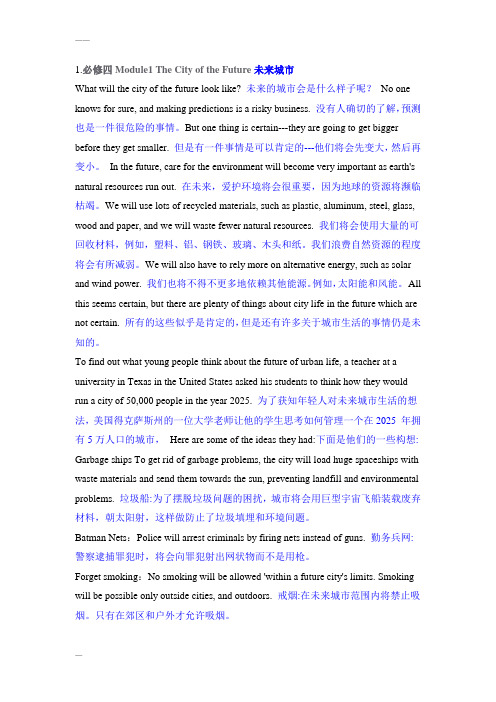
1.必修四Module1 The City of the Future未来城市What will the city of the future look like?未来的城市会是什么样子呢?No one knows for sure, and making predictions is a risky business. 没有人确切的了解,预测也是一件很危险的事情。
But one thing is certain---they are going to get bigger before they get smaller.但是有一件事情是可以肯定的---他们将会先变大,然后再变小。
In the future, care for the environment will become very important as earth's natural resources run out. 在未来,爱护环境将会很重要,因为地球的资源将濒临枯竭。
We will use lots of recycled materials, such as plastic, aluminum, steel, glass, wood and paper, and we will waste fewer natural resources. 我们将会使用大量的可回收材料,例如,塑料、铝、钢铁、玻璃、木头和纸。
我们浪费自然资源的程度将会有所减弱。
We will also have to rely more on alternative energy, such as solar and wind power.我们也将不得不更多地依赖其他能源。
例如,太阳能和风能。
All this seems certain, but there are plenty of things about city life in the future which are not certain. 所有的这些似乎是肯定的,但是还有许多关于城市生活的事情仍是未知的。
外研版选择性必修四Unit 2Period 2 Using language

Paraphrase “proverbs about life”
No pains, no gains.
Two heads are better one. Better late than never.
Post-listening Paraphrase “proverbs about life”
Practice 2 Write the story using the passive voice
Picture 1 One day a little mouse was caught by a lion because the lion was weakened by the little mouse, which made him angry.
Part 2 Listening
Proverbs about life 1. Take notes of proverbs that you will hear on Page 18. 2. Talk about proverbs about life. 3. Get key infornation by listening to the interview on Page 19.
Wisdom has been shared and passed on by storytelling.
It’s believed that that he lived in Ancient Greece between 620 BC and 564 BC.
Most of the characters in his stories are animals, the qualities of which Aesop used to reflect human traits and wisdom③. Each fable teachers a life lesson that Aesop summaries in a short phrase at the end of the story④, called a moral. Today, children and adults all around the world still enjoy Aesop’s Fables⑤.
人教版高中英语必修四外研社版
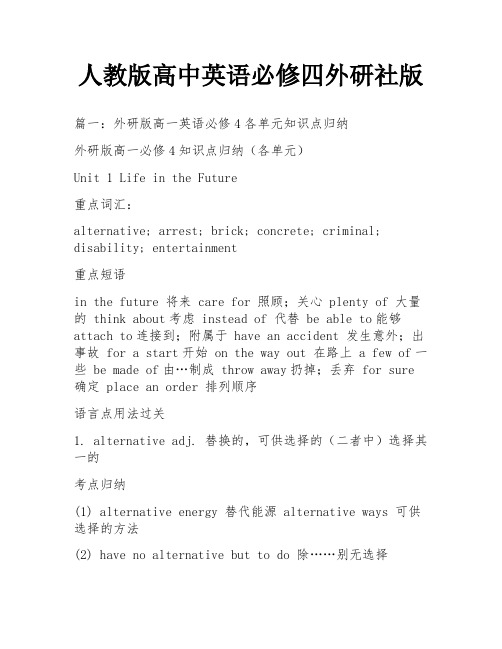
人教版高中英语必修四外研社版篇一:外研版高一英语必修4各单元知识点归纳外研版高一必修4知识点归纳(各单元)Unit 1 Life in the Future重点词汇:alternative; arrest; brick; concrete; criminal; disability; entertainment重点短语in the future 将来 care for 照顾;关心 plenty of 大量的 think about考虑 instead of 代替 be able to能够attach to连接到;附属于 have an accident 发生意外;出事故 for a start开始 on the way out 在路上 a few of一些 be made of由…制成 throw away扔掉;丢弃 for sure 确定 place an order 排列顺序语言点用法过关1. alternative adj. 替换的,可供选择的(二者中)选择其一的考点归纳(1) alternative energy 替代能源 alternative ways 可供选择的方法(2) have no alternative but to do 除……别无选择as an alternative 作为一种变通的方法alternative to ……的替代物辨析:alternative 强调必须从两或多个中选一个choice 强调自由选择,不论选择的方式多或少preference 强调按自己喜欢的方式进行选择2. run out 用完;耗尽考点归纳run after 追求;追赶run at 冲向;突袭run away 逃走;逃跑 run into 偶然遇见;撞上;陷入3. rely on 依赖;依靠考点归纳rely on/ upon s./ 依赖/依靠rely on sb. to do sth. 指望某人做某事rely on it that… 相信…… 指望……辨析rely on 强调凭借经验判断是否可以相信或依赖,侧重于从人品、感情方面的依赖、信赖。
(完整版)高中英语必修四知识点外研版
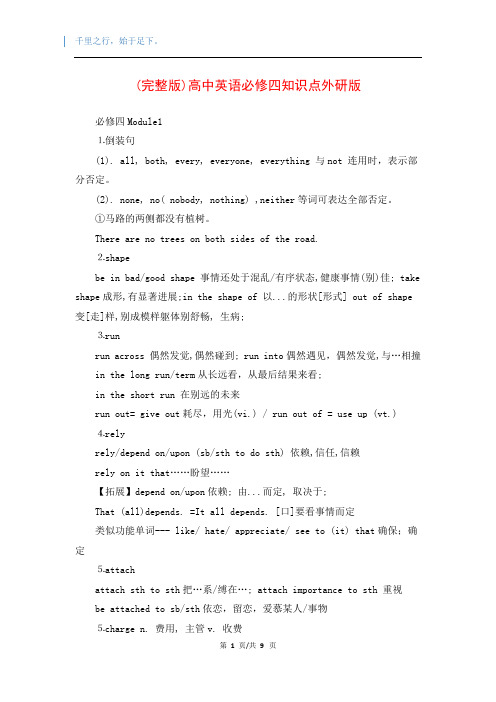
(完整版)高中英语必修四知识点外研版必修四Module1⒈倒装句(1). all, both, every, everyone, everything 与not 连用时,表示部分否定。
(2). none, no( nobody, nothing) ,neither等词可表达全部否定。
①马路的两侧都没有植树。
There are no trees on both sides of the road.⒉shapebe in bad/good shape 事情还处于混乱/有序状态,健康事情(别)佳; take shape成形,有显著进展;in the shape of 以...的形状[形式] out of shape变[走]样,别成模样躯体别舒畅, 生病;⒊runrun across 偶然发觉,偶然碰到; run into偶然遇见,偶然发觉,与…相撞 in the long run/term从长远看,从最后结果来看;in the short run 在别远的未来run out= give out耗尽,用光(vi.) / run out of = use up (vt.)⒋relyrely/depend on/upon (sb/sth to do sth) 依赖,信任,信赖rely on it that……盼望……【拓展】depend on/upon依赖; 由...而定, 取决于;That (all)depends. =It all depends. [口]要看事情而定类似功能单词--- like/ hate/ appreciate/ see to (it) that确保;确定⒌attachattach sth to sth把…系/缚在…; attach importance to sth 重视be attached to sb/sth依恋,留恋,爱慕某人/事物⒌charge n. 费用, 主管v. 收费(1).charge sb money for sth/ doing sth为……收某人钞票(sb.) take charge of 负责,治理……(v.) (sb. +be) in charge of(prep.) (sth. +be) in the charge of sb. 由…负责,治理free of charge 免费(2).charge sb with sth 因某事控告某人==accuse sb. of sth.⒍commandcommand/order sb to do sthcommand/order (that) sb (should) do sth(____v__? + that … (从句用should+v原形)一坚持要求:insist;二命令:order, command; 三建议:suggest(建议), propose, advise; 四请求:demand,desire, request, require)⒍未来举行时由“will / shall + be + doing”构成,具体用法如下:(1) 表示未来某时间或某段时刻正在举行的动作。
必修四Module 2
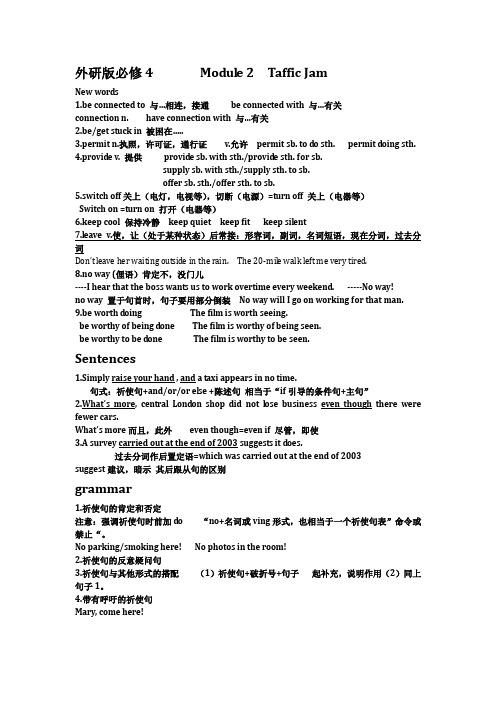
外研版必修4 Modul e 2 Taffic JamNew words1.be connected to 与…相连,接通be connected with 与…有关connection n. have connection with 与…有关2.be/get stuck in 被困在…..3.permit n.执照,许可证,通行证v.允许permit sb. to do sth. permit doing sth.4.provide v. 提供provid e sb. with sth./provide sth. for sb.supply sb. with sth./supply sth. to sb.offer sb. sth./offer sth. to sb.5.switch off关上(电灯,电视等),切断(电源)=turn off 关上(电器等)Switch on =turn on 打开(电器等)6.keep cool 保持冷静keep quiet keep fit keep silent7.leave v.使,让(处于某种状态)后常接:形容词,副词,名词短语,现在分词,过去分词Don’t leave her waiting outside in the rain. The 20-mil e walk left me very tired.8.no way (俚语)肯定不,没门儿----I hear that the boss wants us to work overtime every weekend. -----No way!no way 置于句首时,句子要用部分倒装No way will I go on working for that man. 9.be worth doing The film is worth seeing.be worthy of being done The film is worthy of being seen.be worthy to be done The film is worthy to be seen.Sentences1.Simply raise your hand , and a taxi appears in no time.句式:祈使句+and/or/or else +陈述句相当于“if引导的条件句+主句”2.What’s more, central Lond on shop did not lose business even though there were fewer cars.What’s more而且,此外even though=even if 尽管,即使3.A survey carried out at the end of 2003 suggests it does.过去分词作后置定语=which was carried out at the end of 2003suggest建议,暗示其后跟从句的区别grammar1.祈使句的肯定和否定注意:强调祈使句时前加do “no+名词或ving形式,也相当于一个祈使句表”命令或禁止“。
- 1、下载文档前请自行甄别文档内容的完整性,平台不提供额外的编辑、内容补充、找答案等附加服务。
- 2、"仅部分预览"的文档,不可在线预览部分如存在完整性等问题,可反馈申请退款(可完整预览的文档不适用该条件!)。
- 3、如文档侵犯您的权益,请联系客服反馈,我们会尽快为您处理(人工客服工作时间:9:00-18:30)。
Write a similar passage about your town
The problem about cars is very serious Htuhmesoer dinatyhse. Tclhasesrnouommber of the cars is Telliinncgrjeoakseisnagnrdahpaidvelyf.uInt ilneacdlassstocatnhe tetrekarciebhepleertsahoierfctpelanoslsdlruootosiuomcnhl,ivtahenliynd.gtFshoberereceiagaunrsee big
Why not employ more traffic policemen? There isn’t any room for cars to park.
Why not build underground car parks?
Writing practice
Read the passage carefully and find the way to write a better passage.
The answer to the Ex. 2 on page 17
The road are very busy.
Why not take the underground? Buses are always crowded. Why not use the minibuses? The rush hour is terrible.
parking every where.
The government should make great THeetuloflkmifneomeogrpratjsoiktnhketeoetohscsuelaoarnclslvdstaroeshowstaorhvnmoeeohmlfpiuavrnreomlbyin.loeFcnmloyar.ssesTisgcohnaeanys tesahcohuerlds olfitmenitdtohseunchumthbinegrsobfeccaaursse,
ttrhaeyffbiceljiaevmesthoant tshtuedreonatsdws iellvleerayrnday esbpeetcteiarlalyndwmheonreiitnsanocwlasss.rIofoymou go aernovuirnodnmonensttrtheaetsi,s yliovuelywailnldficnhdeetrhfuelc. ars
1. How many problems does the writer talk about?
The writer talks about four problems, such as too many cars, terrible air, buses stuck, accidents with cyclists.
Speaking practice
The answer to the Ex. 1
1. a road which goes around a city
_r_in_g__r_oa_d_
2. a red one means ‘stop’, a green on means ‘go’
_tr_a_ff_ic__li_g_hts
4. Keep cool ! A. Don’t get angry. B. Wear light clothes.
Homework
1. Review what we’ve learned in the unit.
2. Do the exercise book.
usage of the verbs. ( Do … / Don’t … )
Look at the signs on page 16 and say what they do.
1. They give advice. 2. They give instructions. 3. They give information. 4. They give permission
(no pedestrians)
They give instructions
Don’t turn left. Don’t stop. Don’t walk.
Dos and don'ts for motorists
Tick the ones when stuck in a traffic jam
• 1. Switch off the motor. • 2. Turn on the car radio. • 3. Speak to your passengers. • 4. Follow the rules of the road.
Don’t turn
left.
(no left turn)
Look at the sign and say what the sign mean.
Don’t stop.
(no parking)
Look at the sign and say what the sign mean.
Don’t walk.
traffic except buses and bikes, and build large car park outside the town.
4. Who are they in ‘They should close to the city centre’? ‘They’ means the local government.
tbhueyildberlioeavdesthinattshtuedseknyt,sawnidll lbeuarilnd unbdeetrtegrroaundndmolrine eins. aTchlaesysrcoaonmalso
enevsitraobnlmisehnnt ethwatcistileivseilny athned countrysidcehseoertfhual.t the people
1. The writer divided the passage into two parts. The first part is about problems, and the second part is about the solutions.
2. Put forward the problems first, and give some advice to solve the problems.
pedicabs.
2. There was no way I was going to catch the plane . A. All the roads to the airport were closed. B. It was impossible to catch the plane.
3. It’s enough to drive you mad. 4.A. It can make you get angry. B. It can make you drive badly.
2. What are the causes of the problems? The town is old, the streets are narrow.
3. How many solutions does the writer find?
The writer find two solutions. They should close the city centre to all
MODULE 2 Traffic Jam
Grammar & writing
Imperatives
1. Grammar – Imperatives 2. Talk and write about the traffic problems
in your town
1. Master the grammar 2. Use imperatives
Why not travel at a different time?
The answer to the Ex. 2 on page 17
There aren’t enough road.
Why not build new ones? Too many people break the rules.
could be away from the old cities.
Everyday English
Choose the best explanation
1. Pedicabs are worth using if you want to explore old Beijing.
2. A. Pedicabs cost a lot to us 3. B. It can be a good idea to use
Dos for motorists when • 5. Keep coosltuck in a traffic jam.
Tick the ones when stuck in a traffic jam
•1. Leave the motor on.
•2. Blow your horn.
•3. React when others drive badly. •4. Break the rulDesoonf’ttshfieonrramotaoradtof.friicstjsawmh. en stuck •5. Get angry.
correctly
Grammar
Today we will review imperatives and look at these sentences about
dos or don’ts on page 17.
